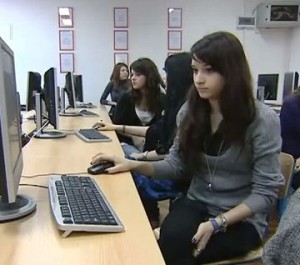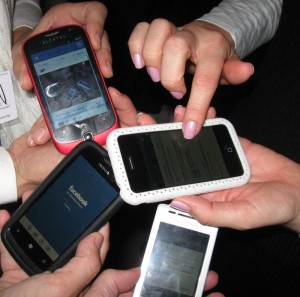 Despite living in the second decade of the 21st century, teachers in Croatia still keep talking about adopting new 21st century teaching practices and skills that students should acquire in order to successfully tackle the challenges of the 21st century – as if the 21st century hasn’t arrived yet!
Despite living in the second decade of the 21st century, teachers in Croatia still keep talking about adopting new 21st century teaching practices and skills that students should acquire in order to successfully tackle the challenges of the 21st century – as if the 21st century hasn’t arrived yet!
On the other hand, this clearly indicates that my fellow teachers are aware that the immense changes technology has brought into our everyday lives should be mirrored in our schools as well. No one will deny that we live differently than 10 or 20 years ago: we handle our finances online, we shop online, we play online, we socialize online, we have become learners who use internet resources for learning and so do our students. Technology has radically transformed the way students learn – and as a logical consequence, the way we teach. Or has it?
 Teachers have become lifelong learners who want to keep abreast of the latest developments in 21st century education and are more than willing to change their practices accordingly. Most of the teachers in my country pursue their professional development at conferences, seminars and workshops organized by the Ministry of Education and other educational agencies.
Teachers have become lifelong learners who want to keep abreast of the latest developments in 21st century education and are more than willing to change their practices accordingly. Most of the teachers in my country pursue their professional development at conferences, seminars and workshops organized by the Ministry of Education and other educational agencies.
Even though the Ministry introduced computer literacy training as an integral part of teacher education programs in the form of ECDL courses (European Computer Driving License) back in 2005, most professional development courses offered to teachers are still more related to the 20th century. However, there are a lot of teachers who acquire new skills, competences and knowledge as self-learners through personal learning networks that they have built on various social networking sites. Most importantly, they are willing to share the knowledge they gain with their colleagues who don’t actively participate in this type of learning. In this way, the circle of teachers who want to inspire, motivate and empower their students with the help of new technologies considerably grows.
However, after becoming ready to get to grips with new technologies, teachers are faced with another obstacle – poorly equipped schools. School funding has never been on a very high level, unfortunately, and with the recent economic crisis which is still a menace in Croatia, even less money is invested in schools.
Let me take my school to show you what this means. I teach at a high school that comprises about 500 students, aged between 15-19, and 44 teachers. The number of computers provided at school is rather small compared to the number of students. We have two computer labs, one with 10 and the other with 16 computers, purchased almost 10 years ago, so you can image what it looks like to work on these old machines. Nevertheless, the labs are used all the time – in fact, with so many enthusiastic computer literate teachers, every week there’s a mad scramble for the two labs. We have a sign-up list in the staffroom, run by the ICT teacher on the first come first serve basis. While I can boast a collegial atmosphere in my staffroom, when it comes to the matters of computers, the situation changes drastically. Sometimes there is so much animosity between the parties involved, that it seems unlikely they’ll ever be reconciled. Luckily, there’s always the next week’s list and the thrill of computer-assisted teaching that is not likely to disappear.
If we don’t need Internet access and can do with only one computer in class, we can avail ourselves of one of the three laptops and beamers. This is often done by teachers, but rather reluctantly because we have to carry this entire load from classroom to classroom as the teachers are those who move, while students remain stationary in their classrooms. The reason for not having our own labs is that we share the premises with another school. Because the school building is too small to hold 1000 students at the same time, we work in shifts – and this is something we would definitely like to change as soon as possible.
A two-shift system means that one week we are at school in the morning from 8 am till 2pm, whereas the afternoon shift from 2 pm till 8 pm (!) is taken by the other school. The next week it’s the other way round. This is not an exception here in Croatia; it’s rather a rule, unfortunately. Hopefully, all schools will have moved to one shift system by 2020.
Because of scarce equipment, many teachers, me included, have wholeheartedly embraced BYOD: Bring your own device. As a huge supporter of BYOD, I strongly believe that students should be taught that the powerful devices they bring to school every day shouldn’t be a distraction from learning but a means to enhance learning. When I first told my students that they were going to use their mobile devices for learning, they were shocked. They never expected their teacher to teach with mobile phones, because more often than not teachers confiscate their devices! However, I was also taken aback upon seeing that only half of their phones were smart devices. Another problem was that only few students had access to the internet on their devices and as we have no wireless network at school, we couldn’t do much. But still, I gave it a try, divided them in groups and it worked! Not exactly as I had planned or hoped for, but still – it was a good beginning that showed potential.
As Sir Ken Robinson said, “If you are not prepared to be wrong, you’ll never come up with anything original!” Nor will you be able to fight the obstacles and become a 21st century teacher! (Yes, yes, I know that the 21st century is in full swing, but you know what I mean!)



Dear Arjana,
Immensely enjoyed reading your article! There seems to be a lot of things in common between Croatian and Moroccan schools in terms of their slow embracing of ICT. The 21st century is already here! Unfortunately, our schools are still run with a 20th century mentality and even worse the greater part of pockets of resistance is constituted by fellow teachers!! But I’m confident dedicated teachers like you are capable of bringing about the desired change that our education and students deserve!
Regards,
Arbi
Dear Arbi,
thank you very much for your comment and your kind words.
As you probably know, today I quoted Mark Prensky on Facebook. He said: “So, let’s not just adopt technology into our schools. Let’s adapt it, push it, pull it, iterate with it, experiment with it, test it, and redo it, until we reach the point where we and our kids truly feel we’ve done our very best. Then, let’s push it and pull it some more. And let’s do it quickly, so the 22nd century doesn’t catch us by surprise with too much of our work undone.”
And indeed, I strongly believe that teachers like you and me should keep on doing what we have started – trying things out, experimenting and changing our teaching practices for the better – in order to bring changes to our educational systems.
Learning from each other and with each other is the right way to do so, I think.
All the best
Arjana
Dear Arjana,
we have a similar situation here in Macedonia. There is only one difference – we actually have computers in every classroom, one per student and there is internet connection in each school (on and off). However, most computers do not work (‘destroyed’ by students) and the teachers do not have appropriate software for the subjects they teach or even if they do, they can’t use them because the computers are ‘down’ 🙂 What’s worse, the teachers are required to teach 30% of the syllabus by using ICT. Now the Ministry decided to distribute some IWBs so some schools, not all of them, get one IWB and can you imagine how that will go (50 teachers fighting over one IWB)?
The teachers are also required to go to professional development events although they cannot apply most of the things they hear there because the schools are not equipped with basic things such as copiers and paper let alone other materials.
It seems that our region is struggling with the same problems when it comes to education and ELT. I just hope that things will get better for the sake of our students. Veliki pozdrav iz Makedonije
Dear Alex,
thanks a lot for your comment!
I can’t tell you how sorry I am – and taken aback as well – to hear about the situation in Macedonia – because I’d heard a lot about the way you integrated technology in your schools, and I’d always dreamed about Croatia following suit – so I’m really disappointed to hear that things don’t work in the way we want them to – or in the way they could work if there was enough understanding! And I think that lack of understanding is one of the crucial reason why things fail: policymakers just don’t understand or don’t want to accept the fact that teaching in the 21st century is not about technology at all! It’s all about teachers who must have all kinds of support from the stakeholders. 21st century education is not a one -way street!
I wish I could say things will get better, but unfortunately, right now I’m on the pessimistic side.
All the best
Arjana
Unfortunatelly, it is all about the money. If you have teachers keen on changing and learning, improving in ICT skills, somehow the Ministry will make something up and all your efforts fall apart. I myself have learned a lot in the past few years, but not to the fact of some seminars organized by Ministry, but on my own. I can just feel your emotions that you have spread through the artical as they are same as mine. The changes we do in our classrooms are first seen as nonsense, but when you show lots of results, some will congratulate you, some will ask your help, while there will always be those who will ignore and envy you! I am grateful to the fact that I am working in oneshift school with school cabinets, we have 3 language cabintes, but the problem of cabinets is still the same – very bad and old equipment. So, what shall we do about it? Hmm, lets do as much as we can and hope things really change by 2020! 🙂 Love the article Arjana
Dear Marijana,
thanks a lot for your comment – and understanding!
It seems that the obstacles we must overcome to make some changes are the same everywhere. But I think the most important is that we believe that we can make a difference – and so we really do make a difference.
Hugs